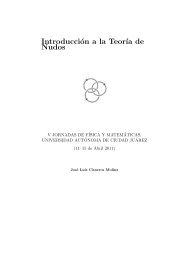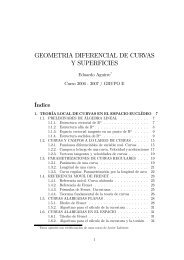Tao_T.-Analysis_I_(Volume_1)__-Hindustan_Book_Agency(2006)
Tao_T.-Analysis_I_(Volume_1)__-Hindustan_Book_Agency(2006)
Tao_T.-Analysis_I_(Volume_1)__-Hindustan_Book_Agency(2006)
You also want an ePaper? Increase the reach of your titles
YUMPU automatically turns print PDFs into web optimized ePapers that Google loves.
20 2. The natuml numbers<br />
Now we can show that certain types of wrap-around do not<br />
occur: for instance we can now rule out the type of behavior in<br />
Example 2.1.5 using<br />
Proposition 2.1.6. 4 is not equal to 0.<br />
Don't laugh! Because of the way we have defined 4 - it is<br />
the increment of the increment of the increment of the increment<br />
of 0 - it is not necessarily true a priori that this number is not<br />
the same as zero, even if it is "obvious". ("a priori" is Latin for<br />
"beforehand" - it refers to what one already knows or assumes<br />
to be true before one begins a proof or argument. The opposite<br />
is "a posteriori" - what one knows to be true after the proof or<br />
argument is concluded.) Note for instance that in Example 2.1.5,<br />
4 was indeed equal to 0, and that in a standard two-byte computer<br />
representation of a natural number, for instance, 65536 is equal to<br />
0 (using our definition of 65536 as equal to 0 incremented sixty-five<br />
thousand, five hundred and thirty-six times).<br />
Proof. By definition, 4 = 3++. By Axioms 2.1 and 2.2, 3 is a<br />
natural number. Thus by Axiom 2.3, 3++ =/: 0, i.e., 4 =/: 0. D<br />
However, even with our new axiom, it is still possible that our<br />
number system behaves in other pathological ways:<br />
Example 2.1. 7. Consider a number system consisting of five<br />
numbers 0,1,2,3,4, in which the increment operation hits a "ceiling"<br />
at 4. More precisely, suppose that 0++ = 1, 1++ = 2,<br />
2++ = 3, 3++ = 4, but 4++ = 4 (or in other words that 5 = 4,<br />
and hence 6 = 4, 7 = 4, etc.). This does not contradict Axioms<br />
2.1,2.2,2.3. Another number system with a similar problem<br />
is one in which incrementation wraps around, but not to zero, e.g.<br />
suppose that 4++ = 1 (so that 5 = 1, then 6 = 2, etc.).<br />
There are many ways to prohibit the above types of behavior<br />
from happening, but one of the simplest is to assume the following<br />
axiom:











